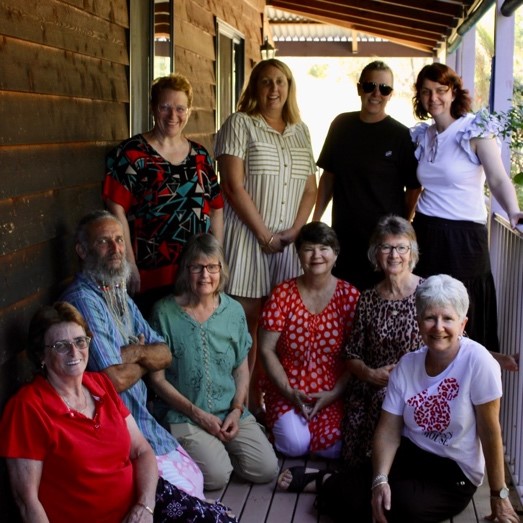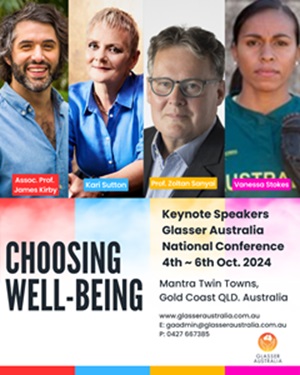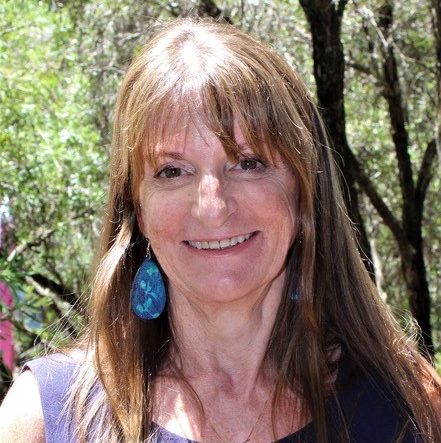
Choice Theory and Compassion
In March this year, I was most fortunate to join an enthusiastic group of Choice Theory practitioners for a 2-day gathering at Max Greives’s picturesque property at Fosterton near Dungog, NSW. The prime objective was to connect in person – participants travelled from Port Lincoln and Whyalla (SA), Wollongong and Newcastle area (NSW), Brisbane (Qld) and Alice Springs (NT). Connecting around the campfire, enjoying shared meals, swimming in the Williams River, walking labyrinths and sharing our ideas via Mini Ted Talks offered a diverse experience. Thanks Max!
The weekend encouraged deeper connection to our ‘inner selves’, to each other and to the natural environment. It is easy to see around us a world where these experiences of connection are in short supply and to witness the consequent suffering in both mental and physical health in our communities. As a mother and grandmother, I am particularly concerned about our response as a global community to the reality of the climate crisis. I connected strongly with Maureen Sansom’s heart felt ‘mini Ted talk’ on compassion and somehow linked these ideas in my mind.
What do we mean by Compassion?
From the Global Compassion Coalition
“The basis of compassion is rooted in the motivation to care.
Compassion is the desire for all sentient beings to be free of suffering and the causes of suffering.
Research shows that there are specific body and brain systems that enable us to:
- Be sensitive to the distress and suffering of self and others.
- Try to work out how to be helpful and do it.”
Underpinning Dr Glasser’s work is the recognition that:
“External control… is the leading cause of suffering.”
(Choice Theory: A New Psychology for Personal Freedom, William Glasser, 1998)
Choice Theory teaches people how to operate from a belief in internal psychology. As a Basic Intensive Instructor, I am confident that Choice Theory, with its emphasis on self-evaluation and the importance of the relationships both with ourselves and with others, has a great deal to offer the practice of compassion. The ‘motivation to care’ is the basis of our need for love and belonging.
In a world where people acted more often out of compassion for themselves and others, might we not feel more connected to our families and our communities?
I have recently read Australian scientist Joelle Gergis’ 2022 book “Humanity’s Moment”. As a member of the International Panel for Climate Change, she is well informed. I resonated with her idea that it is an emotional connection with nature we need in order to motivate the action required for responding positively to the climate crisis. As she points out, and we already know, no amount of facts have yet convinced people to make the necessary changes, which are now clearly established by climate science. Through the concept of Total Behaviour perhaps we can learn to be more aware of our emotional connections and learn compassionate ways to respond.
How could greater compassion for the suffering of the natural world support the mitigation of climate change?
As a community of people who value quality relationships, how might we as a ‘Choice Theory community’ contribute to the growth of compassion in our communities? What would a learning program with that focus, firmly grounded in the principles and practices of Choice Theory, look like?
I believe the teaching of Choice Theory already contributes to the creation of a more compassionate world. I am keen to create a Choice theory program that focuses more explicitly on the practice of compassion and links Dr Glasser’s work to current research findings. I would love to hear from members who are also interested to develop this idea.

Sue Berry







Thank you to Sue Berry for her blog relating to Compassion.
As a person who has been studying Choice Theory and related topics for some time, I have become particularly interested in the benefits of compassion for our overall well-being. I would be very interested in working towards developing a Choice Theory program that focuses more explicitly on the practice of compassion that links Dr Glasser’s work to current research findings.
Medical research and science have proven that there is more to our feelings of psychological safety than constantly striving and craving to satisfy unmet needs.
Dr James Kirby writes: Compassion-based programs have found to help with a huge array of problems, like mental health difficulties, loneliness and social connection, and self-criticism and shame. They can give you a helping hand at the start, and finding your own compassionate habits will play a big role in embedding compassion into your daily life.
At its core, compassion is a self-to-self relationship (self-compassion), it is a relational experience between two people, a group of people, or sometimes a person and another sentient being (eg. pet, animal). A beautiful aspect of this relational core of compassion is that it gives the target of the compassion help and opportunity to feel what it is like to be seen as worthy of care!
Prof. Paul Gilbert writes: Research has found that developing, kindness and compassion for ourselves and others builds our confidence, helps us create meaningful, caring relationships and promotes physical and mental health. Far from fostering emotional weakness, practical exercises focusing on developing compassion have found to subdue our anger and increase our courage and resilience to depression and anxiety.
Kristen Neff reports that: Instead of teaching kids to like themselves more, to feel better than others, special and above average – we need to teach kids and, also ourselves, just to be kind, supportive or a good friend to ourselves. It actually feels good to be kind, to feel connected and to feel present.
Maybe some of our behaviours need some work, but compassion allows us to be our authentic self as a breathing being who is unconditionally worthy.
Dr Rick Hanson reports that: So many of us do harm to each other, because we don’t really know who we are – we think we need to be better than we are or to have more – we think we need to be powerful!
Compassion gives us a sense of being resourced rather than beleaguered and a sense of being connected rather than isolated and lonely. We don’t need to feel so desperate! We don’t feel like we need to impress other people or prove ourselves to them. We know we are not on a hook all the time because we’re rested in a sense of warmth for ourselves and understanding how frail we are, and how affected we are by so many things. We know, when we feel like that, we tend to operate much kinder and less harmful toward other people.
Compassion is essentially the wish that beings NOT suffer! It opens our heart and nourishes our own being as well as the people we care about.
Maureen Sansom
Thank you to Sue Berry for her blog relating to Compassion.
As a person who has been studying Choice Theory and related topics for some time, I have become particularly interested in the benefits of compassion for our overall well-being. I would be very interested in working towards developing a Choice Theory program that focuses more explicitly on the practice of compassion that links Dr Glasser’s work to current research findings.
Medical research and science have proven that there is more to our feelings of psychological safety than constantly striving and craving to satisfy unmet needs.
Dr James Kirby writes: Compassion-based programs have found to help with a huge array of problems, like mental health difficulties, loneliness and social connection, and self-criticism and shame. They can give you a helping hand at the start, and finding your own compassionate habits will play a big role in embedding compassion into your daily life.
At its core, compassion is a self-to-self relationship (self-compassion), it is a relational experience between two people, a group of people, or sometimes a person and another sentient being (e.g. pet, animal). A beautiful aspect of this relational core of compassion is that it gives the target of the compassion help and opportunity to feel what it is like to be seen as worthy of care!
Prof. Paul Gilbert writes: Research has found that developing, kindness and compassion for ourselves and others builds our confidence, helps us create meaningful, caring relationships and promotes physical and mental health. Far from fostering emotional weakness, practical exercises focusing on developing compassion have found to subdue our anger and increase our courage and resilience to depression and anxiety.
Kristen Neff reports that: Instead of teaching kids to like themselves more, to feel better than others, special and above average – we need to teach kids and, also ourselves, just to be kind, supportive or a good friend to ourselves. It actually feels good to be kind, to feel connected and to feel present.
Maybe some of our behaviours need some work, but compassion allows us to be our authentic self as a breathing being who is unconditionally worthy.
Dr Rick Hanson reports that: So many of us do harm to each other, because we don’t really know who we are – we think we need to be better than we are or to have more – we think we need to be powerful!
Compassion gives us a sense of being resourced rather than beleaguered and a sense of being connected rather than isolated and lonely. We don’t need to feel so desperate! We don’t feel like we need to impress other people or prove ourselves to them. We know we are not on a hook all the time because we’re rested in a sense of warmth for ourselves and understanding how frail we are, and how affected we are by so many things. We know, when we feel like that, we tend to operate much kinder and less harmful toward other people.
Compassion is essentially the wish that beings NOT suffer! It opens our heart and nourishes our own being as well as the people we care about.
Maureen Sansom